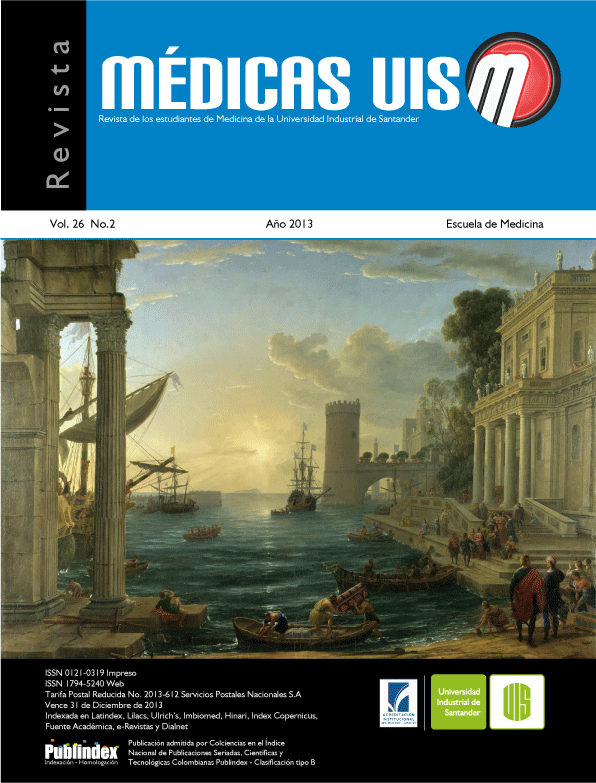Abstract
Chronic constipation is a common health problem that afects all ages, generates poor quality of life, and impacts negatively on the health systems of developed and developing countries. The defnition of constipation is based on the objectivity of stool frequency as well as in the subjective symptoms associated with this disorder like straining, sensation of incomplete evacuation or hard stools. The treatment includes changes in lifestyle, aerobic exercise, increased intake of water and fber, laxatives and the use of motility stimulants or prokinetics. A novel alternative is the enterokinetic prucalopride, a selective 5HT4 serotonin agonist, which increases the peristaltic refex and triggers high amplitude muscle contractions of the colon promoting intestinal deposition. Prucalopride has proven efcacy and safety in adults including elderly patients with chronic constipation. (MÉD.UIS.2013;26(2):29-33).
References
2. Pinto-Sanchez MI, Bercik P. Epidemiology and Burden of chronic constipation. Can J Gastroenterol. 2011;25(Suppl B):11-5.
3. Suares NC, Ford AC. Prevalence of, and risk factors for, chronic idiopathic constipation in the community: systematic review and meta-analysis. Am J Gastroenterol. 2011;106(9):1582-91.
4. Schmulson M, Francisconi C, Olden K, Aguilar L, Bustos-Fernández L, Cohen H, et al. Consenso Latinoamericano de Estreñimiento Crónico. Gastroenterol Hepatol. 2008;31(2):59-74.
5. Remes-Troche JM, Tamayo de la Cuesta, Raña-Garibay R, Huerta-Iga F, Suarez-Morán E, Schmulson M. Guías de Diagnóstico y Tratamiento del Estreñimiento en México. A) Epidemiología (meta-análisis de la prevalencia), fisiopatología y clasificación. Rev Gastroenterol Mex. 2011;76:126-32.
6. Fosnes GS, Lydersen S, Farup PG. Drugs and constipation in elderly in nursing homes: what is the relation? Gastroenterol Res Pract. 2012;290231.
7. Eoff JC, Lembo AJ. Optimal treatment of chronic constipation in managed care: review and roundtable discussion. J Manag Care Pharm. 200814(9):1-17.
8. Drossman DA, Dumitrascu DL. ROME III: New Standard for Functional Gastrointestinal Disorders. J Gastrointestin Liver Dis. 2006;15:237-41.
9. Sun SX, Dibonaventura M, Purayidathil FW, Wagner JS, Dabbous O, Mody R. Impact of chronic constipation on health-related quality of life, work productivity, and healthcare resource use: an analysis of the National Health and Wellness Survey. Dig Dis Sci. 2011;56(9): 2688-95.
10. De Maeyer JH, Lefebvre RA, Schuurkes JA. 5-HT4 receptor agonists: similar but not the same. Neurogastroenterol Motil. 2008; 20(2):99-112.
11. Camilleri M, Kerstens R, Rykx A, Vandeplassche L. A Placebo-Controlled Trial of Prucalopride for Severe Chronic Constipation. N Engl J Med. 2008;358(22):2344-54.
12. Tack J, van Outryve M, Beyens G, Kerstens R, Vandeplassche L. Prucalopride (Resolor) in the treatment of severe chronic constipation in patients dissatisfied with laxatives. Gut. 2009;58(3):357-65.
13. Quigley EM, Vandeplassche L, Kerstens R, Ausma J. Clinical trial: the efficacy, impact on quality of life, and safety and tolerability of prucalopride in severe chronic constipation- a 12-week, randomized, double-blind, placebo-controlled study. Aliment Pharmacol Ther. 2009;29(3):315-28.
14. Ke M, Zou D, Yuan Y, Li Y, Lin L, Hao J, et al. Prucalopride in the treatment of chronic constipation in patients from the Asia-Pacific region: a randomized, double-blind, placebo-controlled study. Neurogastroenterol Motil. 2012 Nov;24(11):999-e541.
15. Camilleri M, Beyens G, Kerstens R, et al. Safety assessment of prucalopride in elderly patients with constipation: a double-blind, placebo-controlled study. Neurogastroenterol Motil. 2009; 21:1256-e117.
16. Müller-Lissner S, Rykx A, Kerstens R, Vandeplassche L. A double-blind, placebo-controlled study of prucalopride in elderly patients with chronic constipation. Neurogastroenterol Motil. 2010;22(9):991-8, e255.
17. Camilleri M, Van Outryve MJ, Beyens G, Kerstens R, Robinson P, Vandeplassche L. Clinical trial: the efficacy of open-label prucalopride treatment in patients with chronic constipation-follow-up of patients from the pivotal studies. Aliment Pharmacol Ther. 2010;32(9):1113-23.
